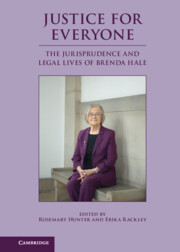Book contents
- Justice for Everyone
- Justice for Everyone
- Copyright page
- Contents
- Figures
- Tables
- Contributors
- Acknowledgements
- Table of Cases
- Table of Legislation
- Table of International Treaties and Conventions
- Brenda Hale Bibliography
- Part I Introduction
- Part II Personal Reflections
- Part III Academic
- Part IV Law Commissioner
- Part V Judge
- Judicial Leadership
- 11 Brenda Hale
- 12 Assessing Lady Hale’s Impact on the UK’s Final Appeal Courts
- 13 The Qualities of Lady Hale’s Legal Reasoning
- 14 On Personhood for Everyone
- 15 Lady Hale and Access to Justice
- 16 Lady Hale in the South African Courts
- Family Law and Children’s Rights
- Human Rights and the State
- Private Law and the Individual
- Part VI Creative Encounters
- Index
15 - Lady Hale and Access to Justice
from Judicial Leadership
Published online by Cambridge University Press: 05 May 2022
- Justice for Everyone
- Justice for Everyone
- Copyright page
- Contents
- Figures
- Tables
- Contributors
- Acknowledgements
- Table of Cases
- Table of Legislation
- Table of International Treaties and Conventions
- Brenda Hale Bibliography
- Part I Introduction
- Part II Personal Reflections
- Part III Academic
- Part IV Law Commissioner
- Part V Judge
- Judicial Leadership
- 11 Brenda Hale
- 12 Assessing Lady Hale’s Impact on the UK’s Final Appeal Courts
- 13 The Qualities of Lady Hale’s Legal Reasoning
- 14 On Personhood for Everyone
- 15 Lady Hale and Access to Justice
- 16 Lady Hale in the South African Courts
- Family Law and Children’s Rights
- Human Rights and the State
- Private Law and the Individual
- Part VI Creative Encounters
- Index
Summary
The concept of ‘access to justice’ has wide appeal despite meaning different things to different people. Although it has been defined in various, and sometimes inexplicable, ways depending on the context, the term access to justice conveys several consistent principles of importance to societies, the rule of law and justice systems. Under the rule of law, law stands above all people and all people are equal before it. In this way, access to justice is an aspiration. No person and no institution, including the state, should be above the law. But for all people to be equal before the law there must be equal access to the law. This requires people knowing their rights and entitlements, being aware of processes for remedy or redress, having the ability to access those processes, being able effectively to participate in those processes, and achieving an outcome that is just, in light of the merits of the case and by processes that are conspicuously fair and perceived to be so. Effective access to justice ensures that laws are more than hollow promises of protection for the vulnerable and powerless.
- Type
- Chapter
- Information
- Justice for EveryoneThe Jurisprudence and Legal Lives of Brenda Hale, pp. 153 - 168Publisher: Cambridge University PressPrint publication year: 2022

